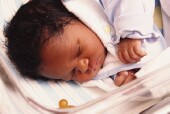- Could Your Grocery Store Meat Be Causing Recurring UTIs?
- Are You Making This Expensive Thermostat Error This Winter?
- Recognizing the Signs of Hypothyroidism
- 10 Strategies to Overcome Insomnia
- Could Artificial Sweeteners Be Aging the Brain Faster?
- Techniques for Soothing Your Nervous System
- Does the Water in Your House Smell Funny? Here’s Why
- Can a Daily Dose of Apple Cider Vinegar Actually Aid Weight Loss?
- 6 Health Beverages That Can Actually Spike Your Blood Sugar
- Treatment Options for Social Anxiety Disorder
Naps May Boost Your Baby’s Memory

Babies process and preserve memories during those many naps they take during the day, a new study suggests.
“We discovered that sleeping shortly after learning helps infants to retain memories over extended periods of time,” said study author Sabine Seehagen, a child and adolescent psychology researcher with Ruhr University Bochum in Germany. “In both of our experiments, only those infants who took an extended nap for at least half an hour within four hours after learning remembered the information.”
The study doesn’t definitively confirm that the naps themselves help the memories stick, but the researchers believe that is happening. “While people might assume that infants learn best when they are wide awake, our findings suggest that the time just before infants go down for sleep can be a particularly valuable learning opportunity,” Seehagen said.
Scientists have long linked more sleep to better memory, but it’s been unclear what happens when babies spend a significant amount of time sleeping.
In the new study, researchers launched two experiments. In each one, babies aged 6 months or 12 months were taught how to remove mittens from animal puppets. Then some of the babies took a nap for a half-hour and some didn’t. A total of 216 babies were tested.
Then the researchers tested the babies to see if they remembered how to remove the mittens either four or 24 hours later.
The researchers found that only the babies who’d taken naps after learning actually remembered what they’d learned, especially after 24 hours.
Study author Seehagen said it’s “quite unlikely” that the babies who didn’t nap remember less because they were tired. Still, she said more research is needed to confirm the results.
So, how many naps do babies need and how long should they be?
“The small number of studies makes it difficult to make firm recommendations to parents,” said Angela Lukowski, an assistant professor of psychology and social behavior at the University of California, Irvine.
However, “the lesson for parents seems to be that napping after learning may help infants remember information over time,” she said. She added that naps of at least 30 minutes seem to be helpful, although there hasn’t been much, if any, research into shorter naps.
As for adults, don’t worry about napping as a memory aid. “There are many studies in the literature showing the benefit of naps for adults, but adults do not need to nap to retain new memories,” said Rebecca Gomez, an associate professor of psychology at the University of Arizona.
The new study is published in this week’s issue of the Proceedings of the National Academy of Sciences.
More information
Visit Harvard Medical School’s Healthy Sleep website for more about sleep, learning and memory.
Source: HealthDay
Copyright © 2026 HealthDay. All rights reserved.










